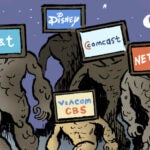 Statisticians know that correlation does not imply causation – so, applying that same logic to advertising, a consumer who saw an ad and converted could have already been predisposed to purchase.
Statisticians know that correlation does not imply causation – so, applying that same logic to advertising, a consumer who saw an ad and converted could have already been predisposed to purchase.
One big issue with attribution, as it exists today, is that many marketers still rely on last-touch. Video also poses unique challenges, since brands sometimes fall back on brand-building metrics rather than performance KPIs.
Hotels.com is beta testing a solution from DSP TubeMogul, designed to measure more effectively the incremental steps a customer takes before converting. Although Hotels.com has a strong root in performance, not all marketers’ strategies were as evolved.
“We had advertisers who said, ‘I believe online video has a place in my direct-response campaigns, but for the life of me, I can’t find a way to prove it’s working,’” said Tom Riordan, director of special operations for TubeMogul.
Although TubeMogul had measurement capabilities for brand lift and viewability, those tools catered primarily to its historic base of brand advertisers. So the company built Ad Swap to factor in data that performance marketers might want for display within the same system they used for video.
Think of it as basic placebo testing made more accurate, TubeMogul claims, because the DSP has significant buying power and can rely on its network effect for testing.
Here’s how it works: Brands who opt in (about a dozen so far) are essentially allowed to pool campaign insights. One marketer’s ads would serve as a placebo for other advertisers targeting similar audiences with similar placements with the same publisher.
When this happens, TubeMogul would allow the advertiser in the control group to “pause” its bid and swap in an ad from an identical advertiser (in terms of audience and placement) to serve to a randomized audience.
The process aims to eliminate the impact of in-market bias, so an advertiser could see more clearly who converted because of its ad or who would have converted organically regardless.
Riordan emphasized advertisers aren’t giving up targeting data through their use of Ad Swap. And, since the tool facilitates a blind test, one advertiser wouldn’t know whom the other advertiser was in the first place – they would only see the performance results.
Travel booking site Hotels.com wants to drive more bookings to its partners. It sees the measurement tool as a way to lower the cost of determining true campaign effectiveness.
“Lift testing became a big chunk of your budget for non-working media because you historically took a large chunk of your budget and paid for inventory to run placebos against,” said Steven Quach, senior director of online marketing for Hotels.com.
In the display world that’s cost-effective, but in the video world “it becomes very cost-prohibitive very quickly,” Quach added. “You’re talking about CPMs that are three to six times the cost.” Because Ad Swap allows current customers to use each other as placebos, there’s virtually no cost.
Additionally, Hotels.com aims to bridge performance from upper-funnel video buys with lower-funnel strategies like search.
As a travel site, there’s a common tendency to focus on “really tight attribution channels,” Quach described, where it is more cost-effective to enter the conversation at the last minute at the bottom of the funnel than when somebody is in research mode for a trip.
“We found that we have to swim upstream and resist the urge to remain at the bottom,” Quach said. “We’ve found our acquisition channels are really buoyed by our brand efforts up top, so we’re doing a ton of work to correlate the fluffy to the hard metrics and draw a tight line between that to prove awareness drives conversion.”














